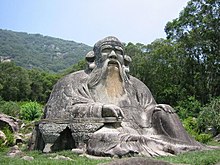
Back Laozi Afrikaans Laozi ALS ላው ድዙ Amharic Lao Tse AN लाओ-त्सू ANP لاوتزه Arabic لاوتزه ARZ Laozi AST लाओ जू AWA Lao Tzu Aymara

Laozi (Lao Tsu, Lao-Tze) was a Chinese philosopher best known for Taoism,[1] the Tao Te Ching,[2] and becoming a deity of Taoism and Chinese folk religions. A legendary figure of Chinese culture, Laozi may have lived during the Warring States period.[3] Laozi's work influenced anti-authoritarian[4] and Legalist philosophers.[5]
- ↑ "Lao-tzu – Founder of Taoism". www.en.hubei.gov.cn. Government of Hubei, China. Archived from the original on 20 July 2019. Retrieved 15 November 2018.
- ↑ "Laozi". Stanford Encyclopedia of Philosophy. Stanford University. 2018.
- ↑ Kohn (2000, p. 4)
- ↑ "Lao-tse". ztopics.com.
- ↑ Han Fei Tzu, the paradigm legalist, wrote one of the earliest commentaries on the Lao Tzu (cf. University of Hong Kong page).